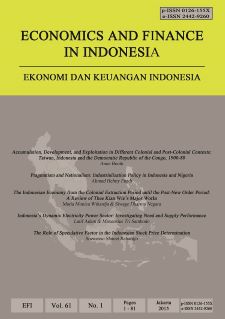See the Aims and Scope for a complete coverage of the journal.
Economics and Finance in Indonesia (EFI) publishes quality research papers on the Indonesian economy. The journal welcomes original ideas in the form of either theoretical or empirical papers or in between of the two. The journal covers wide areas, including but not limited to international economics, agricultural economics, industrial organization, capital market, demography, development economics, economy in crisis, economy of rural areas, education and human resource economics, energy economics, environmental and natural resources economics, financial sector, health economics, history of economic thoughts, institutional aspect of economy, investment, labor economics, maritime economics, monetary economics, political economy, poverty economics, public sector economics, regional economics, and urban economics.
EFI is accredited by the Ministry of Research, Technology, and Higher Education (Kementerian Riset, Teknologi, dan Perguruan Tinggi) with SK No. 21/E/KPT/2018 dated July 9, 2018. In the ministry’s Science and Technology Index, EFI is listed as a SINTA-2 Journal. EFI is also indexed/listed by IDEAS/RePEc, Directory of Open Access Journal (DOAJ), and Garuda.
All articles are written in English and selected through double-blind peer review process. EFI publishes biannually (twice a year) in June and December with financial support from the Institute for Economic and Social Research, Faculty of Economics and Business, Universitas Indonesia (LPEM FEBUI). Neither the Institute nor the University takes responsibility for the views expressed by the authors. EFI authors benefit from extensive editing, and English proofreading service. This journal charges no fee to authors for publication of articles and articles published in EFI will be open access. These policies would increase the journal’s readerships.
EFI was originally launched in 1948 as “Maandblad voor Financien“ before being renamed into “Economics and Finance in Indonesia – Ekonomi dan Keuangan Indonesia (EKI)”.This transformation signifies a reorientation of the journal's focus to better communicate the research findings of Indonesia economists to a wider international economic readership. Today, EFI is aspiring to be a forum for a fruitful academic exchange between Indonesian economists and their overseas colleagues.
At the end of 2022, all journals using the Open Journal System platform within the University of Indonesia experienced a hacker attack, including the Economics and Finance in Indonesia Journal. This resulted in the loss of some archive data, including the ongoing article review process in the Economics and Finance in Indonesia Journal at that time. In 2023, the Economics and Finance in Indonesia Journal fully transitioned to using the Digital Commons platform. The use of this platform is expected to enhance the journal management system capabilities and optimize the impact of each published articles to a broader audience.
Current Issue: Volume 71, Number 2 (2025) December 2025
Articles
The Importance of the Safety Net Program for Informal Workers’ Food Security Amid the COVID-19 Pandemic in Indonesiahttps://doi.org/10.47291/efi.2025.06
Rodhiah Umaroh, Amirusholihin Amirusholihin, and Yuliawati Yuliawati
pp. 88-102
Tracking Impact: Leveraging Pre-existing Monitoring Tools for Assessing Indonesia’s Free Nutritious Meal (Makan Bergizi Gratis) Programmehttps://doi.org/10.47291/efi.2025.07
Putu Geniki Lavinia Natih
pp. 103-139
Firms Heterogeneity in Indonesia’s Manufacturing and Services Sectorshttps://doi.org/10.47291/efi.2025.08
Rizki Nauli Siregar
pp. 140-159



